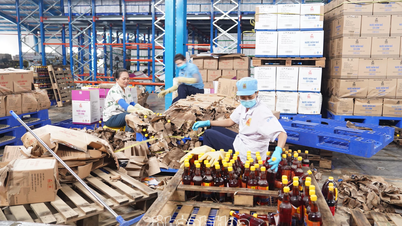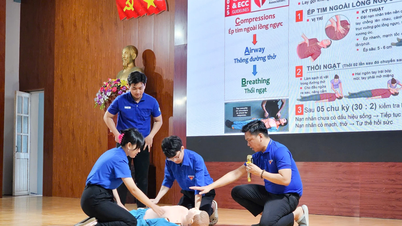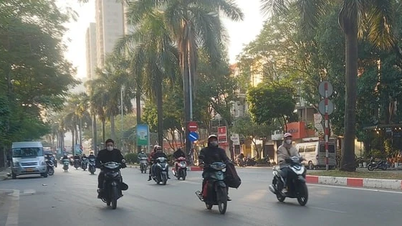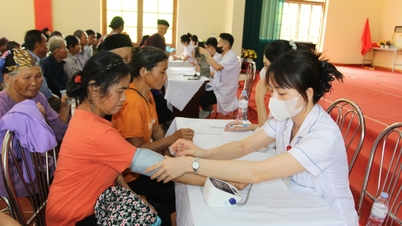Lan, 27, a media worker in Hanoi, used to think that weekend trips and coffee breaks could help her escape the feeling of being out of breath in life. Until one afternoon, she fell asleep for more than two hours in a crowded coffee shop. When she woke up, Lan found herself without the energy to stand up, nor enough reason to try to persevere like usual.
Lan says her healing journey began when the pressures of work and expectations of success built up. She indulged in shopping, spontaneous travel, and daily coffee appointments as a way to calm herself. Bills piled up, sending Lan into a new spiral of financial anxiety. The more she tried to “get happy fast,” the more she felt out of breath.
When she went to see a psychologist, Lan was analyzed as having emotional exhaustion due to the feeling of having to succeed early, having to constantly prove her worth, and having to "be beautiful and stable" on social networks. Mental health Her anxiety reached a breaking point. She sought counseling and learned to recognize her emotions instead of pushing them away.
Nhat Hoang also faced a period of psychological breakdown after a series of excessively successful efforts. He is an IT engineer in Ho Chi Minh City, and once surprised his friends when he suddenly booked a flight to Phu Quoc on a weekend night just because he was "suffocating with life".
The two-day trip cost him almost a month’s salary, but it still didn’t make him feel any better. Back in the city, Hoang continued shopping, changing phones, laptops, and ordering a few more online courses, though he didn’t complete any of them.
“ Every time I felt tired, I thought I had to do something quickly to get out,” Hoang said. The more he tried to run, the more he realized he was drifting into a hole. The pressure to succeed before the age of 30 made him sacrifice his sleep, meals, and emotions. Every night, Hoang woke up feeling like he was falling behind.
Hoang only really stopped when he realized that his habit of “healing by spending” was dragging him into new stress, financial burdens and feelings of failure. He went to a psychologist, learned how to set boundaries with work, reduce unrealistic expectations and adjust his lifestyle. “ It took me months to understand that mental health cannot be solved by buying things right away ,” Hoang said.

According to experts, while the global average life expectancy is constantly increasing, mental health is becoming a silent factor that is dragging down the quality of life, especially in the 18-35 age group. This is the group that is under the greatest pressure from many sides, and at the same time carries the highest expectations.
Rates of young people experiencing anxiety disorders, depression and emotional exhaustion are on the rise. In response to the need to find peace, healing activities are becoming increasingly popular among young people.
This movement reflects the desire to soothe the soul, reduce trauma and eliminate negative and insecure thoughts. The United Nations officially called 2021 the "Year of Healing", marking the need for mental recovery after the trauma caused by the COVID-19 pandemic.
Although there are no official statistics on the number of people participating in healing services, on the social networking platform TikTok, hashtags like "chualanh" and "healing" are always in the top 100 most searched and used keywords, with millions of posts, attracting tens of billions of views.
Popular healing trends such as meditation, experiential travel, leaving the city to return to the countryside, sports, workshops, listening to podcasts, music , movies and reading books all receive strong responses.
From a medical perspective, Dr. Tran Thi Hong Thu - Mai Huong Daytime Psychiatric Hospital ( Hanoi ) said that the need for healing of young people reflects the growing concern about mental health. In Vietnam, about 15% of the population - equivalent to 15 million people - are suffering from mental health problems. mental disorders, of which the rate of depression and anxiety accounts for about 5.4%.
Dr. Thu’s hospital has seen a 15-25% increase in the number of young patients coming to the clinic due to stress and chronic fatigue each year. Before going to the doctor, many young people have tried healing courses but the results were not as expected.
“ They said they felt comfortable and at ease while attending the healing sessions, but as soon as they returned to reality, the feeling of fatigue and deadlock returned, ” Dr. Thu shared.
According to her, pursuing unprofessional healing services can cost young people money, waste time, affect their work and study, and more importantly, fail to solve the root cause of the problem.
The healing trend also partly reflects the vulnerability, lack of endurance and the mentality of avoiding difficulties of some young people. In addition, social networks make many people imitate, thinking that they have psychological problems when in fact they do not.
To avoid “losing both money and health”, Dr. Tran Thi Hong Thu recommends that young people with psychological problems should seek out experts and specialized doctors for proper diagnosis and treatment. Each individual also needs to develop a reasonable work and rest plan, and learn how to cope with stress to maintain sustainable mental health.
Source: https://baolangson.vn/ap-luc-phai-thanh-cong-som-khien-nhieu-nguoi-tre-kiet-que-cam-xuc-5066326.html







































































































Comment (0)